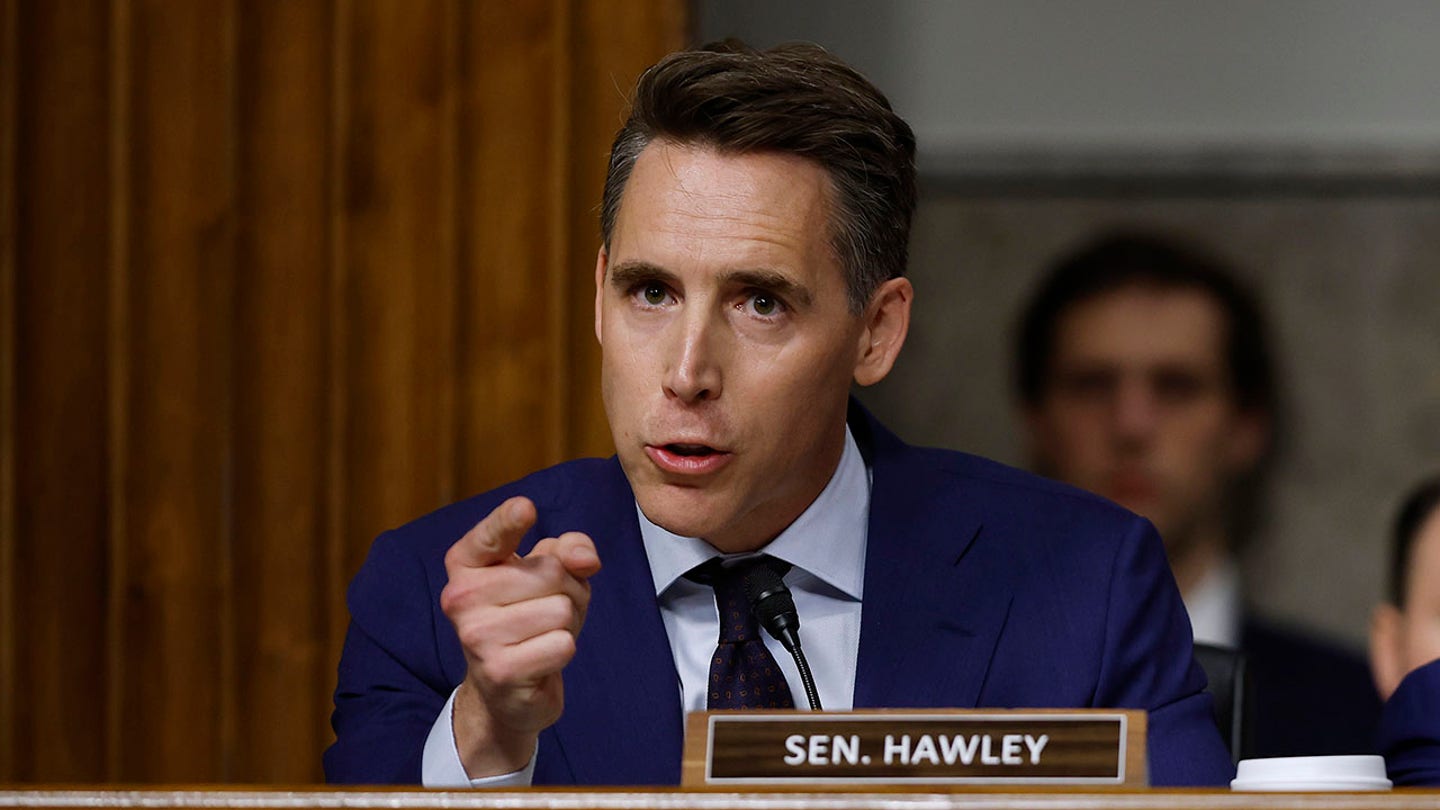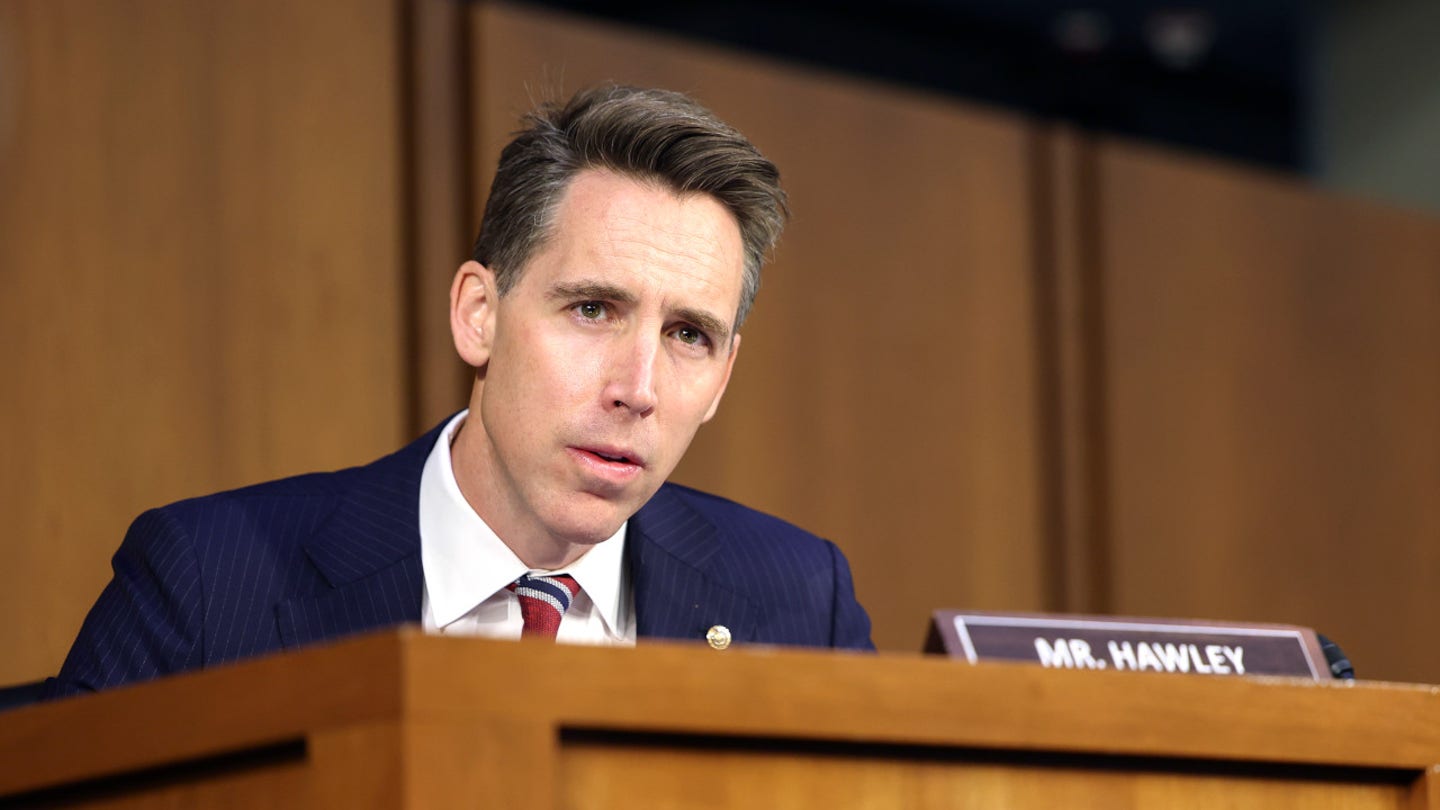Beyond Watergate: Hawley Accuses Biden’s DOJ of Running a ‘Stasi-Style’ Spy Operation on GOP Senators
In a fiery political storm that’s rapidly spiraling through Washington, Senator Josh Hawley has unleashed explosive allegations against Special Counsel Jack Smith, accusing him of turning the Department of Justice into “Biden’s Stasi.” What began as another partisan skirmish over the January 6 investigation has erupted into something far darker — claims of secret surveillance on sitting U.S. senators, possible violations of constitutional protections, and comparisons to one of the most infamous scandals in American history: Watergate. But this time, Hawley insists, “it’s worse.”
The Missouri Republican delivered his accusations with blistering force, claiming that Smith and his team had authorized or overseen a covert data sweep of phone records belonging to at least eight Republican senators. The alleged targets included Lindsey Graham, Marsha Blackburn, Ron Johnson, Cynthia Lummis, Bill Hagerty, Dan Sullivan, Tommy Tuberville — and Hawley himself. Their supposed crime? Objecting to the 2020 election results and raising constitutional concerns about the certification process. According to Hawley, the FBI, under Smith’s directive, accessed metadata — logs showing who called whom and when — without notifying Congress or the senators involved. The revelations, he said, represented “an abuse of power beyond Watergate,” suggesting that a sitting administration had used law enforcement tools to monitor its political enemies.
The story first broke after internal FBI documents surfaced, bearing the label “Arctic Frost — Election Law Matters — Sensitive Investigative Matter — CAST.” Within the file, according to several Republican senators briefed on the findings, analysts from the FBI’s Cellular Analysis Survey Team had conducted “toll analysis” — a technical term for mapping phone communication patterns. It was, in essence, a digital map of political relationships at the highest levels of government. For critics, this was not simply a matter of gathering evidence. It was a chilling reminder of how easily surveillance tools can be turned inward, aimed not at terrorists or spies, but at elected officials themselves.
Hawley didn’t mince words. “This is not law enforcement,” he declared. “This is political warfare.” His remarks echoed across conservative media, with hosts and commentators drawing parallels to East Germany’s Stasi, the Cold War secret police notorious for infiltrating every corner of private life. Hawley’s accusation that “Biden’s DOJ is running a Stasi operation” became a rallying cry, igniting outrage among Republican voters and further hardening partisan divides in Washington.

Jack Smith, for his part, has remained largely silent in public. But people close to the Special Counsel’s office insist the actions in question were lawful and narrowly scoped. According to officials familiar with the investigation, the phone data was obtained through standard legal channels — likely grand jury subpoenas — as part of efforts to reconstruct communications around January 6. No audio content was intercepted, they emphasized, and no senator was personally targeted for political reasons. Still, for many, the idea that federal investigators could quietly examine communication records of sitting lawmakers without congressional oversight struck a nerve.
The timing of the revelations has made the controversy even more combustible. With the 2024 election still reverberating and the 2025 political landscape dominated by bitter recriminations over “weaponized justice,” the notion that President Biden’s DOJ could be spying on opposition senators plays perfectly into Republican narratives of deep-state corruption. Conservative media seized on the leaked memo, with headlines warning of “Biden’s Spying Scandal” and “An Abuse Worse Than Watergate.” Former President Donald Trump, facing his own legal battles against Smith, quickly amplified the story on social media, calling it “total proof that these thugs are out of control.”

In the corridors of Capitol Hill, the fallout was immediate. Senate Republicans demanded emergency hearings and a full-scale investigation into the FBI’s actions. Senator Ron Johnson called the surveillance “absolutely chilling,” while Marsha Blackburn labeled it “tyranny masquerading as law.” Lindsey Graham, one of the alleged subjects of the data review, said he had never imagined a day when “our own government would spy on us because of our political views.” Even some centrist Democrats privately admitted that if the allegations proved true, it would mark a stunning breach of the constitutional separation of powers.
Behind the scenes, investigators are scrambling to verify exactly what happened. Was the data collection part of a routine, court-approved inquiry? Or was it an overreach by zealous prosecutors stretching their mandate to the limit? Sources within the FBI have suggested that the analysis was authorized by a federal grand jury, a crucial legal safeguard. Yet critics argue that such technical legality does not absolve the moral and political implications of surveilling legislators who were, at the time, opposing the sitting administration. For Hawley, the issue is not merely procedural — it’s existential. “If they can spy on senators,” he warned, “they can spy on anyone.”

Civil liberties experts warn that the current uproar underscores a deeper crisis: the erosion of boundaries between law enforcement and political power. “If these reports are accurate,” said one former Justice Department attorney, “it represents a grave violation of the principles that protect our democracy. Even if the investigation had a legal basis, the lack of transparency and oversight is deeply troubling.” Others caution that the outrage may be premature, noting that data requests are a standard part of complex federal investigations and do not necessarily imply misconduct. Yet, as one Senate aide put it, “the optics are devastating.”
The White House has tried to distance itself from the controversy, insisting that President Biden had no knowledge or involvement in the Justice Department’s investigative decisions. Press Secretary statements have emphasized DOJ’s independence and declined to comment further on ongoing investigations. But for the administration’s critics, that response rings hollow. “Biden can’t hide behind ‘independence’ when his DOJ is spying on Congress,” said Hawley in a press conference, his tone crackling with anger. “Either he knew, or he’s lost control of his own government.”
The scandal also raises profound constitutional questions. The U.S. Senate is not merely another group of citizens; it is a coequal branch of government. Any investigation that touches its members must navigate complex legal protections designed to preserve legislative independence. The so-called “Speech or Debate Clause” of the Constitution shields lawmakers from executive overreach in most investigative contexts. If the FBI accessed senators’ communications without proper authorization, it could amount to a violation of that clause — a constitutional crisis in its own right.
In response to mounting pressure, several watchdog groups and civil liberties organizations have called for an independent inquiry into the Justice Department’s conduct. The Office of Special Counsel — the same oversight body that enforces the Hatch Act, which limits political activity by federal employees — has reportedly opened a preliminary review. Smith’s team has dismissed the move as “baseless and politically motivated,” arguing that it is part of a coordinated attempt to undermine the legitimacy of his ongoing prosecutions. Nonetheless, the investigation continues, and the possibility of formal charges or disciplinary action looms.
Meanwhile, the political theater shows no signs of slowing. Conservative lawmakers are drafting new legislation to restrict the Justice Department’s surveillance powers and to mandate congressional notification whenever data from elected officials is subpoenaed. Hawley has promised to “drag every responsible party before Congress” until the full truth is revealed. He’s even suggested appointing a special prosecutor to investigate the investigators. “The American people deserve to know whether their government has turned its power inward,” he declared on the Senate floor. “Because if we’ve crossed that line, there’s no going back.”
For now, the evidence remains murky. No direct proof has surfaced that the Biden administration personally ordered or even knew about the phone data collection. Jack Smith, a veteran prosecutor known for his aggressive approach, continues to lead multiple Trump-related cases, and his defenders insist that his methods are legal and justified. But in an era of collapsing public trust, legality may no longer be enough. Perception has become reality, and in the public mind, the line between justice and politics has blurred almost beyond recognition.
As the controversy grows, parallels to the darkest moments in American political history are impossible to ignore. Watergate began with a burglary and ended with a president’s resignation. The “Biden’s Stasi” allegations may prove less dramatic in fact — but potentially more dangerous in precedent. The tools of modern surveillance are invisible, instantaneous, and vast. A single subpoena can unlock a web of connections that would have taken months of physical surveillance to uncover decades ago. In that sense, the stakes are far higher than they were in Nixon’s time.
For now, the Capitol hums with speculation and unease. Staffers whisper about what else might be uncovered. Lawmakers trade nervous glances, wondering if their own calls were logged, their own communications mapped. In coffee shops around Washington, the words “Biden’s Stasi” circulate with the same hushed intensity that “Deep State” once did. And through it all, Jack Smith’s silence feels almost cinematic — the calm of a man convinced of his righteousness, or perhaps the calm before the storm.
Hawley, meanwhile, shows no signs of retreating. He’s become the public face of defiance, hammering home a message that resonates deeply with those who already distrust federal power. “This is not about party,” he said in one recent interview. “It’s about whether we still live in a free country.” His critics scoff, dismissing the rhetoric as opportunistic grandstanding. But for millions of Americans watching from the sidelines, the story has struck a raw nerve.
Whether this moment becomes another Washington scandal that fades into partisan fog — or the beginning of a reckoning for the institutions of American justice — remains to be seen. But one thing is certain: the accusation that a sitting administration spied on its political opponents has reopened wounds that never truly healed. In the shadow of Watergate, America once vowed “never again.” Now, more than fifty years later, it may be forced to ask whether that promise still holds.

